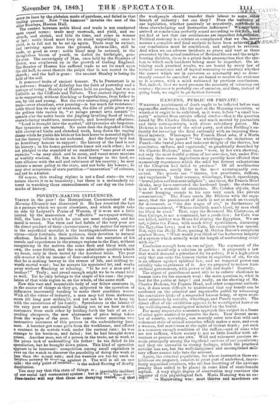POVERTY-MAKING INFLUENCES.
VIRTUE in the poor I the Metropolitan Commissioner of the Morning Chronicle has discovered it. He has recorded the fact in a passage which we quote elsewhere, and which might take its side by Ledyard's Praise of Woman, if it were not a little tainted by the mannerism of "effective" newspaper-writing, Still, the 'bare facts which he cites are most eloquent, and his moral is sound. The vices and bad habits of the very poor are the direct product of their circumstances ; the matter for surprise to the superficial moralist is the inextinguishableness of their virtue—their fortitude, their patience, their devotion to natural affection. Indeed it is impossible to read the narration of his travels and experiences in the strange regions to the East, without recognizing in the natives the same flesh and blood with our own, the same foibles, and the same admirable qualities which we boast, only in them tested by the harshest trials. The poor silk-weaver with an income of four-and-sixpence a week knows that he is making leeway in the stream of life, and drifting to- viaidit mortal want; but he accepts his appointed lot; and works away without flinching or relaxing. "Is he not a man and a brother?" Truly; and proud enough might we be to stand.trial so well. Yet he only belongs to the staple of his race: the popu- lation of that wide region is, on the whole, of the same stuff. Now this vast and respectable body of our fellow creatures is, in the course of things as they go, subjected to the operation of influences incessantly tending to make their condition worse. With all the virtue of industry, a man may toil from darksome morn till long past midnight, and yet not be able to keep up with the subsistence of his family. Speculators in the labour of the very poor are continually looking out td see how to filch customers from each other by holding forth the bait of an ex- ceeding cheapness, the new abatement of price being taken froth the *wages of the poor. The same writer mentions two instructive instances of this process in the embroidering busi- ness. A butcher got some girls from the workhouse, and offered a contract to do certain work under the current rate : he was strange to his business, and failed ; but he had brought down prices. Another man, son of a person in the trade, set to work at the pious task of underselling his father : he too. failed in his speculation, but he brought down prices. This kind of operation appears to be incessant: competition among small capitalists is ever on the watch to discover the possibility of doing the work at less than the actual rate; and the weavers are too far sunk in heitnses poverty to vo.....;•ine against it. The will is all on one side : the only point or resista,...._ is the naked flooring of deadly destitution. .
You may say that this state of things its - inevitable incident of our social and economical system : but is it Beee-teader will say that these are decaying d that
the workpeople should transfer their labour to sciiiie5tTh-T-- ---i' ''' branch of industry : but can they? Does the tear -4.. our legislation, whether positively or negatively, cu 1* „' - --'-*
these overwhelming and destructive influences! W y arrived at conclusions perfectly sound according to th et find at last that our conclusions are imperfect fo
1.; '411./4
"‘NWai
Political economy is a science so complicated that we e . • • . . assume a complete and final analysis to have been achielitilatraS-Agb our conclusions must be conditional, and subject to revision. And when we see adverse incidents so grave and vast as those presented by the actual condition of Bethnal Green and the neigh- bouring districts, there is a prima facie presumption that the sys- tem to which such incidents belong must be imperfect. On at- taining such practical results, we are bound by every law of natural conscience and of logical reasoning to ascertain whether the causes which are in operation so constantly and so disas- trously cannot be amended; we are bound to receive the evidence as it accrues, with a mind unbiassed by previous -conclusions. Not, indeed, that we need presume the necessity of retracing our course : the error is probably one of omission, and then, instead of going back, we ought to go further forward.


























 Previous page
Previous page